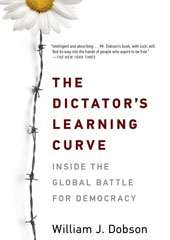Governing China: Accountability Vs. Responsibility
What flaws do conservative Chinese thinkers see in Western democracy compared with their own system?
June 2, 2013

Not everyone agrees that China’s future lies in borrowing ideas from the West.
Pan Wei, a conservative scholar at Beijing University, takes a dim view of the supposed advantages of democratic innovation and political pluralism — and he will not hesitate to tell you so.
Pan says that those who favor the spread of democracy at local levels in China are mainly interested in legitimizing the wealth they have already stolen. He also believes that the majority principle is an illegitimate principle.
In his view, electoral politics has very little to do with the success of Western democracies. In Russia, after all, the introduction of democracy did little more than “help the rulers cheat and mislead the common people.”
Even the most basic arguments in favor of democracy — for example, that it offers feedback on the public’s priorities and helps to hold officials accountable — do not apply to China.
Election cycles of two or four years are just too slow. Says Pan: “China moves faster than that.”
Pan is one of the more outspoken Chinese voices on democracy’s shortcomings.
Typically, Chinese critics of Western democracy have rested their arguments on cultural grounds, suggesting that too much political pluralism was somehow ill suited to Chinese society.
People like Pan increasingly make their case by simply pointing to the state of the world’s democracies.
They cite the high levels of voter apathy, or the intense political partisanship that freezes the gears of democratic governments in the United States, Europe, India, and Japan.
The fact that a populist movement like the Tea Party can single-handedly tie up the U.S. political agenda, they say, is equal parts absurd and alarming.
The political deadlock that led to the Standard & Poor’s rating agency downgrading U.S. creditworthiness was utterly mind-boggling to Beijing.
One of the strengths of a Leninist system is its ability to direct massive amounts of resources at a specific target. It doesn’t matter if the target is economic growth, disaster relief, a dissident political movement or even environmental policy.
For good or ill, the system can mobilize around a goal, marshal its manpower, and move swiftly.
Pan becomes an unabashed advocate when the topic turns to the modern Chinese system of governance.
“The major difference between Western and Chinese political civilization is that the Western governments emphasize accountability and the Chinese government emphasizes responsibility,” says Pan. “So what is responsibility?”
Responsibility means balancing three groups of interests:
- Partial interest versus the interest of the whole
- The interest of the present versus the interest of the future, for example, the environment versus people’s demand for wealth today
- The interest for change and the interest for order.
“A government needs to balance these three groups of interest. This is called responsibility. The politics of responsibility is much more sophisticated than the politics of accountability.”
Pan’s formulation is a very Chinese notion of meritocracy where the state is administered by intelligent, capable and virtuous public servants.
Today, modern examples of such a system would be Singapore and Hong Kong.
They are successful and effectively administered governments in which the state’s attachment to the rule of law is intended to mollify the need for boisterous electoral politics.
While China’s size and complexity pose far greater challenges than a city-state like Singapore, Pan believes the rising standards for Chinese officials — the examinations, appraisals, rotations, schooling and so on — have set the country on the right path.
“The Chinese governing body is the youngest in the world,” says Pan, referring to the strict term limits and age-mandated retirement that keep turnover high. “How could you get to the top before you are too old? That’s competition.”
But if China has another archetype as old as the virtuous Confucian scholar who administers wisely, it is probably the tyrannical local official who terrorizes the people, safe in the knowledge that the emperor and his court are too far removed to do anything about it.
Indeed, stories of the corruption and venality of local officials have provided grist for some of China’s greatest works of poetry, music, and literature.
(Three of China’s four classic novels — “Journey to the West,” “Outlaws of the Marsh” and “A Dream of Red Mansions” — offer rich descriptions of official corruption through the ages.)
The party knows that corruption is the one weakness that has beset all authoritarian regimes, past and present.
Tunisia, Egypt and Libya are just new entries in a ledger with a long list of names.
“On the entire continent of Africa, not a single government is better than China in terms of corruption,” he argues.
“And in central Asia nothing is comparable. And in Europe, I think China is better than some and worse than others. Maybe around the level of France, but certainly better than Italy!”
He glosses over the fact that in many of these countries, especially the democratic ones, when corruption is revealed, people have a means of holding officials accountable.
In China, the party polices itself. It has made an effort to do so because it realizes corruption is a surefire way for its legitimacy to erode quickly.
Between 1997 and 2002, the top body charged with holding party members accountable — the Central Discipline Inspection Commission — punished nearly 850,000 members and expelled more than 137,000 from the party.
In recent years, the commission has established “accusation centers” where people can file anonymous complaints. It has also set up a confidential hotline to report abuses.
In 2005, more than 115,000 party members were reportedly punished across the country. In 2010, the number stood at roughly 146,000 officials.
The numbers are less impressive when you realize that the vast majority get off with nothing more than a warning.
Furthermore, these investigations represent a small percentage of the number of cases reported to the commission.
Being so bullish on China’s political system, Pan was not worried about the wave of revolutions in the Middle East reaching China’s shores. He conceded there could be some “disturbances” in China, but there were advantages to this as well.
“Many smaller earthquakes are better than a big one,” he replied.
In closing, Pan had one more thought. “I think the Communist Party is just a new dynasty.” Given that Chinese dynasties rise and fall, I asked, “Do you think it’s early in its life? Do you think it’s middle-aged?”
“I think it’s early,” he replied. “The average life span is 270 years or so in China, for the major dynasties.” By his reckoning, the regime has a little more than 200 years left.
For some, though, that may be too long to wait.
Editor’s note: This article is adapted from The Dictator’s Learning Curve: Inside the Global Battle for Democracy (Anchor) by William J. Dobson. Published by arrangement with the author. Copyright © 2013 by William J. Dobson.
Read previous

The Balkans: Europe’s Soft Underbelly
June 1, 2013
